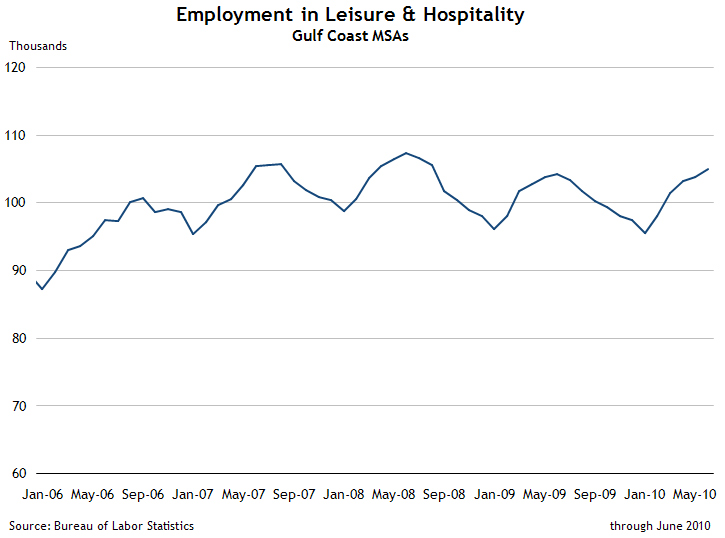There has been a clear shift among our contacts in the Gulf Coast leisure and hospitality sector since the oil stopped flowing in mid-July. Cautious optimism has replaced outright pessimism. That said, most realize that the damage done by cancellations and fewer visitors may not be undone in 2010. However, fears that long-term damage to the Gulf Coast "brand" of clear water and white sandy beaches beyond the current year have subsided somewhat.
Assessing the economic impact on tourism-related businesses is a challenge. We have received anecdotal accounts of reduced hiring of seasonal workers by hotels and property managers, but this reduction is unlikely to be reflected in data through June. Reports of cancellations from our contacts in the region did not begin in earnest until after Memorial Day. In addition, hotels appear to be faring better than rental properties such as beach houses and condos, so the overall impact on accommodation-related employment may not be as great as feared. Clean-up workers, oil company employees, media, and National Guardsmen appear to have stepped in to fill some of the vacancies created by potential Gulf Coast vacationers changing their plans because of the spill. Of course, it is fair to assume that vacationing families spend more on hotel amenities and pump more into the local economy through retail purchases, recreational outings, and dining out than do workers employed to deal with the spill. For that reason we expect to see the greatest impact on recreation jobs as well as food services because of the decline in recreational fishing excursions and fewer visitors patronizing eating and drinking establishments.
On July 20, the U.S. Bureau of Labor Statistics released state and local employment data for June and revised data for May. Based on the total number of people employed in arts, entertainment, recreation, accommodation, and food services in Gulf Coast metro areas (excluding New Orleans) we estimate there were roughly 105,000 tourism-related workers along the affected areas (see the chart). This number is up slightly compared with June of last year and is in line with the average for June over the past decade. We do not see any large swings in the monthly data, but as we noted above, most cancellations came in after Memorial Day and accommodation jobs appear to be the least vulnerable.
Perhaps vacationers who put off travelling to the Gulf Coast may choose to take a fall vacation this year once they are assured that the coast is clear—figuratively and literally—but a recent survey suggests challenges lie ahead for the Gulf Coast's leisure and hospitality businesses. The State of the American Traveler survey conducted by Destination Analysts Inc. showed 26 percent of respondents said they were less likely to travel to the region over the next 12 months.
By Amy Ellingson, a research analyst at the Atlanta Fed



